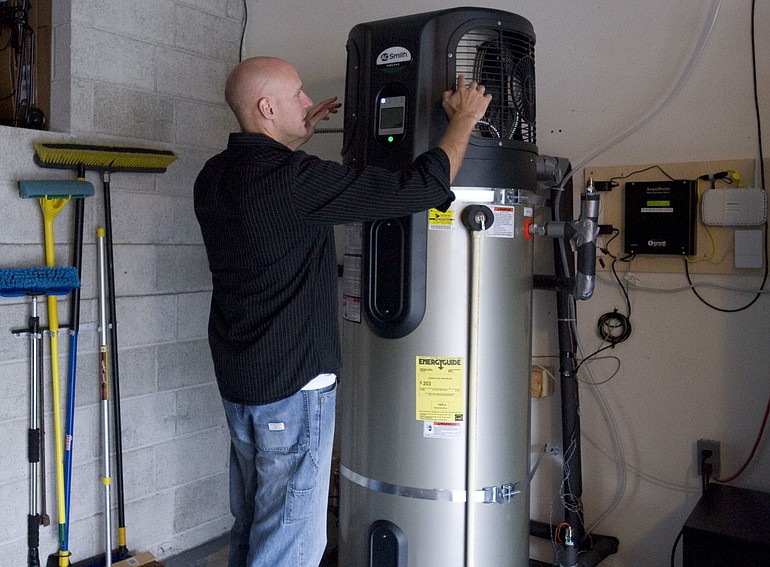When Clark Public Utilities approached the Wrights to test out a heat-pump water heater, the Vancouver family of four decided to give it a go.
They already had been systematically replacing their appliances with more energy-efficient ones.
“It just kind of fits in with what we want to do with our family: be good stewards of the environment,” Mike Wright said.
The Wright household is one of four in Clark County participating in the pilot project, which involves the local utility, the Bonneville Power Administration and the Electric Power Research Institute. Nationwide, 160 homes are testing the water heaters, which employ 25-year-old heat-pump technology already widely used to heat homes.
Heat-pump water heaters cost about $1,500, compared with $900 for an efficient electric water heater.
In heat-pump water heaters, a fan draws air into the unit, which absorbs heat from the air. The unit then uses that heat to warm water, which is stored in an insulated tank.
“So far so good,” Wright said of his family’s experiment. “We haven’t noticed a lack of hot water.”
The Wrights’ old water heater was in the garage, which made their household a good candidate for the test. Heat-pump water heaters are their most efficient when located in a space that doesn’t get cooler than 40 degrees. The units exhaust cool, dehumidified air, so it might not make sense to put them in a heated space such as a basement.
If the Wrights find their showers are too chilly, they can set the water heater to use a backup traditional electric heating element. Wright said that hasn’t been necessary so far. The water heater has an 80-gallon tank, which has been enough to keep everyone in hot water.
Wright said he had one worry going into the experiment: “Heat pumps are a little louder.”
But noise hasn’t been a problem, even though the water heater is just outside the family room, where the Wrights spend a lot of time.
“It’s not loud at all,” Wright said. “It maybe runs for 15 minutes when it’s heating up the water, then it turns off. It’s about the same volume as a fridge when the condenser is going. Inside the house, we can’t hear it at all. … The only thing I’ve noticed is a cooler garage.”
Monitoring equipment will transmit data about energy usage to the Electric Power Research Institute through December 2011. The organization will use the data to calculate whether the heat-pump water heaters are energy efficient in real-life settings.
If heat-pump water heaters prove to be efficient, the BPA might implement programs to encourage more widespread use of the technology, said Katie Pruder-Scruggs, a BPA spokeswoman.
If families participating in the pilot project become dissatisfied with the heat-pump water heaters, they can have the units hauled away and replaced with a traditional model.
But “I don’t foresee us getting rid of the unit,” Wright said.
He said he hasn’t yet received an electric bill that reflects a whole month of using the unit, but “for once, we’re excited to see our bill.”
Erin Middlewood: 360-735-4541 or erin.middlewood@columbian.com.



